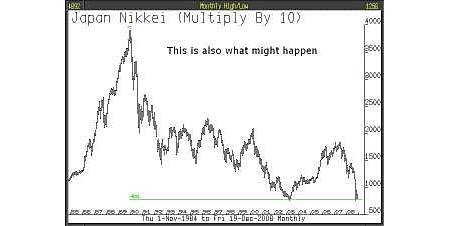
As the ancient Chinese curse goes “May you live in interesting times”, and we certainly are. Capitalism is facing its greatest test since the 1930s. We expect it to survive, but the years ahead will not be easy. From an investment point of view it is important to understand that this is not a repeat of any of the previous experience that those of us alive have lived through before. So, although reflecting upon previous bear markets and trying to time a re-entry point for equities is almost everybody’s abiding interest, it is, more likely than not, dangerous. The developed world’s stock markets are not likely to be higher than they were in 2000 until at least the year 2015 with the great risk that before then they could go very much lower. Note: Japan’s stock market is still nearly 80% below its 1990 all time high.
It is our firm belief that, in the absence of recent government intervention, a large proportion of the banking system in the developed world might have collapsed. The authorities realised the calamitous conditions and acted fast. Banks, having not failed and having received substantial government financial support, are now constantly criticised, particularly by politicians – who have never worked in a business in their life – who say that they should now lend more freely. It is presumed that the economy will recover if only the banks would renew lending and, bearing in mind what the authorities have done, why would they not do that?
The reasons are many-fold. The first is that the people and businesses who most desperately need to borrow are often those whose collateral is questioned and whose financial status is doubted. We know of borrowers of undoubted status who have good collateral and who in today’s market can borrow. Banks rarely refuse genuinely good business.
Another major reason is more fundamental. A bank can only increase its lending if it can retain some profits, but if profits are to be retained they have first to be made and that’s it! The independent economist, Andrew Smithers, recently wrote a report entitled Getting Banks to Lend. This report is full of insights. First off, he acknowledges that until bank credit is loosened up, consumption and investment will be cut back, causing output to fall and the economy to weaken further. Further defaults just make matters worse. Retrenchment would be fine if one bank was in trouble on its own, but if all banks retrench simultaneously, the system stops working. And that’s what we’ve got, with no likelihood in the short term of an end to it, unless something dramatic takes place.
For a bank to retain profits, it needs first of all to be profitable; and this it can’t be if assets on its balance sheet are of questionable value and subject to periodic write-downs. Andrew Smithers says the only way to go forward is to revalue those assets to the floor so that whatever happens in the future they can only rise in value. However, the trouble with doing that is that the solvency of the bank will be undermined and a massive further recapitalisation by the government would need to take place. Clearly the sums involved are huge. Willingness to do this is impaired for two reasons:
Firstly, the people running the banks don’t want to admit to the scale of their incompetence, which the revaluation of the assets would show.
Secondly, the government is hoping that it will come right anyway by recapitalising only up to a certain level and working off these residual questionable asset values over time.
The problem is lack of credit availability rather than the cost of the credit. That non-availability will continue until all of the banks’ bad debts have been acknowledged and written off.
An example of the problem was highlighted when HBOS recently delivered a very bad trading statement. Having recently received £15.5 billion extra capital, they now expect to make another £8 billion write-down. What this clearly indicates is that they are in no shape to meaningfully expand their lending.
Mervyn King’s answer to the problem is to threaten full nationalisation, and in a sense that is what Andrew Smithers is proposing. Once the bad assets have been written down to an uncontroversial level and balance sheets recapitalised by government finance, the banks would finish up owned by the tax-payers. This was echoed by the Deputy Governor who said “It may well turn out that further capital injections are required.”
Our central bank knows things are getting worse because they recently received a survey from their regional agents saying that one third of companies had experience of tightening in the availability of short term loans.
When all is said and done, no strong economy can sustain without a strong banking system. We are confronted with a weak economy and an even weaker banking system. Resolution of that problem is crucial and unless that happens, the economy is doomed to a nuclear economic winter.
The good news is that fullCircle will, whatever happens, aim to align client’s portfolios to the changing conditions, so as to still benefit.
• This article was written by John Robson & Andrew Selsby at Full Circle Asset Management, as published in the threesixty Newsletter.